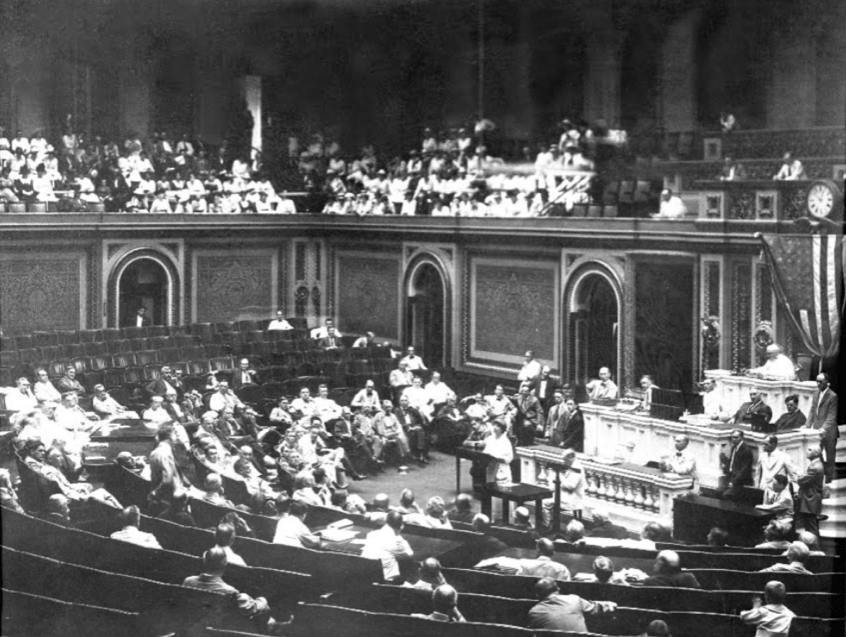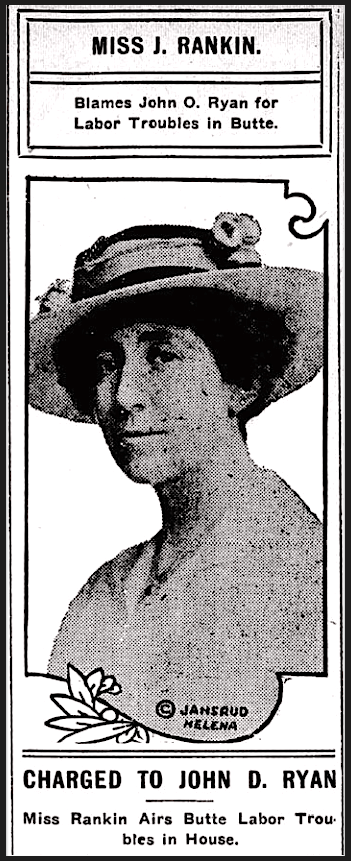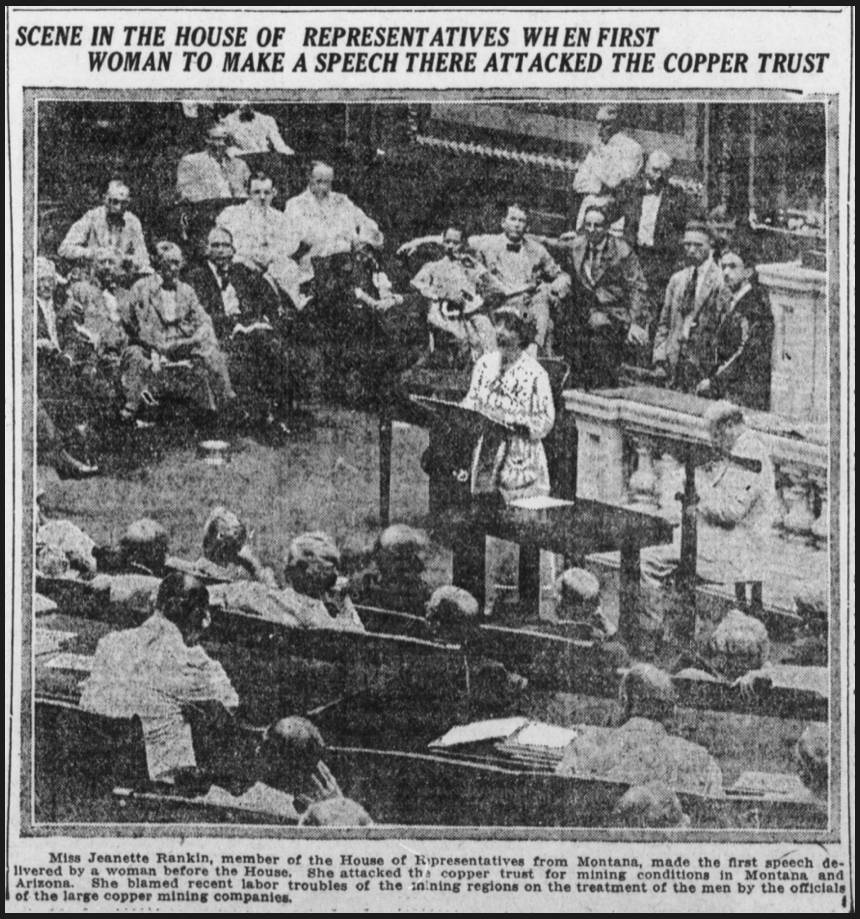No one is safe where lynching is sanctioned.
-Jeannette Rankin
Hellraisers Journal, Wednesday August 22, 1917
From the Appeal to Reason: Two Brave Women Speak for Labor
The Appeal to Reason of August 18th featured the opinions of two women elected to represent the people: the first, Miss Jeannette Rankin of the United States House of Representatives, and the second, Mrs. Rosa McKay of the Arizona House of Representative. Today we begin with Miss Rankin who outlines conditions at Butte. We will conclude tomorrow with Mrs. McKay and her view of recent events in Bisbee.
Butte and Bisbee Outrages Scored
by Brave Woman Representatives
The stories of the labor troubles in Butte, Mont., and Bisbee, Ariz., are told below by two women, both of them elected representatives of the people from their respective districts.
Miss Jeanette Rankin, of Montana, the first Congresswoman of the United States, told of conditions in Butte in a speech [August 7th] before the national House of Representatives.
In an article to the Appeal, Mrs. Rosa McKay, member of the Arizona House of Representatives from Bisbee, Cochise county, Arizona, tells of the Bisbee deportation.
The activity of these two women in behalf of justice for the workers and in defense of the cause of true democracy, leaves little wonder why the reactionary, corporation-serving politicians have sought to prevent the entrance of woman into politics. Speed the day when woman will take her full share in the affairs of government! Miss Rankin and Mrs. McKay have done the cause of suffrage a great service in the noble stand they have taken.
By Jeannette Rankin
Member United States House of Representatives.
I find in studying the powers given the President to enable him to carry on the war, that he has been given power to commandeer and operate practically every industry that is engaged in supplying materials necessary to the progress of the war. Among other things, he has been given power to take over the coal mines and operate them. But now he has the power to take over metalliferous mines, as copper is a metal essential to the everyday life of the people of all civilized nations, and is one of the basic necessities of war. It is a necessity we cannot overlook in this present war.
You have been informed by the daily press that the big copper mines in the west-in Arizona and Montana-are not operating to their fullest capacity. This is due to the fact that the miners and the mine workers are unable to agree. The result has been an alarming decrease in the output of copper. According to an estimate of the council of national defense, only 12,000,000 pounds of copper were produced in Butte in the month of July, while the normal output is 30,000,000 pounds a month.
This disagreement has also meant great lawlessness. In Bisbee hundreds of men were deported in complete contempt for law and order. In Butte a man [Fellow Worker Frank Little] was lynched by masked men. As our laws read today there is no means for handling the situation. The president has no real power by which to act.
Therefore I am issuing this resolution, which I hope the committee will have ready to report to Congress when the absent members return.
* * *
I have tried every means that I know of to get governmental machinery in action to handle this deplorable situation in my state. I have kept in close touch with the situation in Butte. After the deportation occurred in Bisbee I received telegrams from Butte asking for federal protection. I mentioned this to the department of labor and was informed that the department was doing all in its power to handle the situation through its representative, Mr. Rogers [Rodgers].
A week ago last night I received a telegram at midnight saying that Mr. Rogers had left Butte, that no satisfactory settlement had been made, and that the people feared violence, and urged me to ask Secretary Wilson for protection. I telephoned this message to the secretary at once. He asked me to see him the next day.
I tried all the next day until late in the evening, and was still trying to see the secretary on Wednesday morning [August 1], when I received word that a man had been lynched. Then came more appeals for protection. I tried to see the President, the department of labor, the department of justice and, finally, the war department. The only satisfaction I received was in the war department, when I convinced them that the troops guarding the mines had been federalized and, therefore, were under federal control. Then it was agreed that some investigation of the situation would be made.
In a crisis of this kind, coming as it does in time of war, when all our attention should be centered upon the enemy and not on local difficulties, there should be some official means by which the government may protect itself against a decrease in necessary productiveness, and by which the people of each state may be guaranteed the protection provided by the constitution of the United States.
Some explanation of the situation in Butte may be helpful at this time. Just before the outbreak of the European war, difficulties in the Butte miners’ union resulted in the disruption of the union, so that for the past three years the men have been working in the Butte mines practically unorganized.
* * *
For some years the Anaconda Copper Mining Company has been using what is called in Butte the “rustling card system.” This rustling card system is practically a blacklist on a national scale-or perhaps, it had better be called a “white list.”
It works in this way: The Anaconda Copper Mining Company has an employment bureau, to which every miner must apply if he wishes a job. Here his record is investigated, and if it is found that he has never complained of his working conditions, if he has a clean record as to unions (that is, if he is not what they call an agitator), or if he has voted the right political ticket, he is given a “rustling card.” This card is in effect a permit, as we say in the west, “to rustle” for a job. The man who applies for work at any mine is first asked to show his “rustling card.” If he cannot produce one, he is not hired.
This rustling card system has effectively discouraged the men from organizing. It has prevented them from demanding the enforcement of laws requiring safety devices in the mines. It has caused them to hesitate to discuss their grievances on the outside. The conditions of the mines have grown more and more unsafe.
I have heart-breaking letters from the wives of the miners saying that when their husbands went to work they never knew whether or not they would ever return, and that they lived in constant anxiety.
On June 8, 160 men were burned to death in a fire in one mine. This was the climax. The men stopped work. The workers knew that they would never be safe as long as the “rustling card” system existed. For under that system every man who complained of conditions or reported dangers or endeavored to form an organization was laid off for one reason or another, and it would be impossible for him to obtain work again in any mine in Montana or else where. It is easy to see the great necessity of abolishing the rustling card system.
Mr. John D. Ryan of New York, the president of the Anaconda Copper Mining Company, is the man responsible for this situation. You are probably all familiar with Mr. Ryan’s name in connection with his recent affiliation with the activities of the American Red Cross. If Mr. Ryan says the “rustling card” system must be abolished, it will be.
I have tried in vain to draw this fact to his attention. Though my telegrams to Mr. Ryan have been read, as yet I have had no response.
It was with regard to these same mines that the newspapers some months ago were filled with the news of large government purchases of copper for the war. Through the patriotic efforts of some prominent men the government was able to secure copper for 16.67 cents a pound when the market price was 32 cents.
At this price the government purchased 50,000,000 pounds of copper and later purchased 50,000,000 more. However, the companies refused to accept this same price, and they are now waiting for the committee on war purchases to say what it will pay.
This incident has received no publicity, but it is interesting to the American people to know that if the committee sets the price at the present market price this one purchase will cost the government $6,000,000 more than the advertised price. Added to this the copper interests have the advantage of not being on the embargo list.
———-
[Photograph added.]
From Pennsylvania’s Harrisburg Telegraph of August 13, 1917:
SOURCE
Appeal to Reason
(Girard, Kansas)
-Aug 18, 1917
https://www.newspapers.com/image/67312794/
Montana’s Agony:
Years of War and Hysteria, 1917-1921
-by Arnon Gutfeld
University Presses of Florida, 1979
https://books.google.com/books/about/Montana_s_Agony.html?id=nF12vgAACAAJ

IMAGES
Jeannette Rankin, MN Princeton Union, Aug 9, 1917
http://chroniclingamerica.loc.gov/lccn/sn83016758/1917-08-09/ed-1/seq-7/
Jeannette Rankin, PA Harrisburg Tph, Aug 13, 1917
http://chroniclingamerica.loc.gov/lccn/sn85038411/1917-08-13/ed-1/seq-9/
Jeannette Rankin, US House of Reps, 1st Speech Aug 7, 1917
https://www.google.com/culturalinstitute/beta/asset/rankin-delivers-her-first-full-speech-on-the-house-floor-on-august-7-1917/5QFoYju9yegJAQ?hl=en
See also:
Jeannette Rankin
https://en.wikipedia.org/wiki/Jeannette_Rankin
The New York Times
(New York, New York)
-Aug 8, 1917
http://query.nytimes.com/gst/abstract.html?res=990DEFD8133AE433A2575BC0A96E9C946696D6CF&legacy=true
MISS RANKIN URGES CONTROL OF MINES
Montana Member Offers Resolution to Take Over
Copper Properties in West.
—–SAYS PRODUCTION LAGS
—–
Accuses John D. Ryan and “Rustling Card”
System of Causing Labor Unrest.Special to The New York Times.
WASHINGTON, Aug. 7.–Demanding legislation to enable the President to take over and operate the copper mines in Arizona and Montana where strikes are now curtailing production, Miss Jeannette Rankin, member of Congress, made her first speech in the House today.
Miss Rankin was heard by crowded galleries and practically every member of the House who is now in Washington. She was liberally applauded as sh assailed the “Copper Trust.”
[…..]
The Washington Times
(Washington, District of Columbia)
-Aug 7, 1917
http://chroniclingamerica.loc.gov/lccn/sn84026749/1917-08-07/ed-1/seq-1/
MISS RANKIN MAKES MAIDEN SPEECH
—–
Scores Copper Magnates
Amid Applause of House
—–
EVERY GALLERY PACKED TO
HEAR CONGRESSWOMAN
—–By GERTRUDE STEVENSON
[…..]
URGES CONTROL OF METAL MINES
BY GOVERNMENT[…..]


